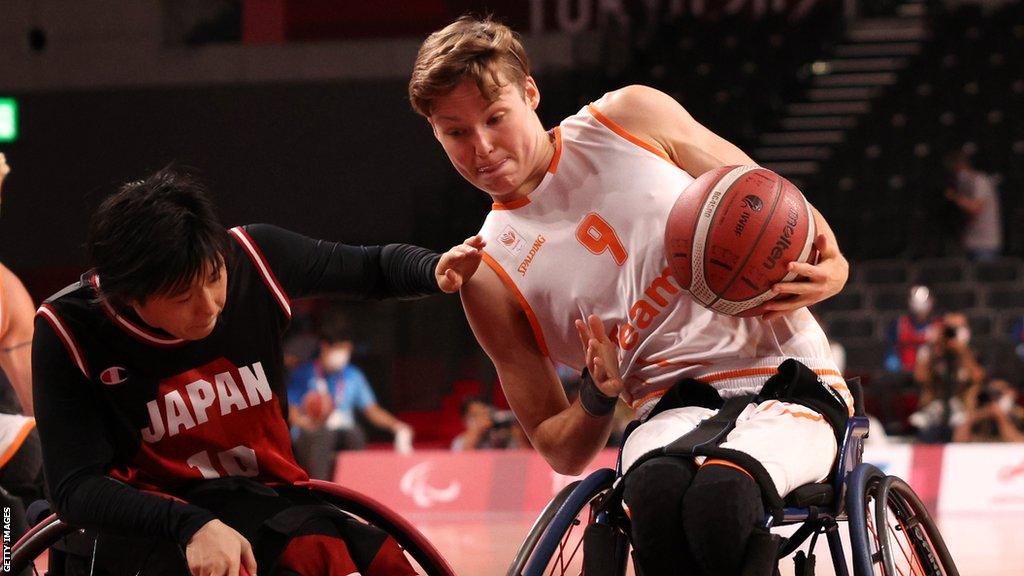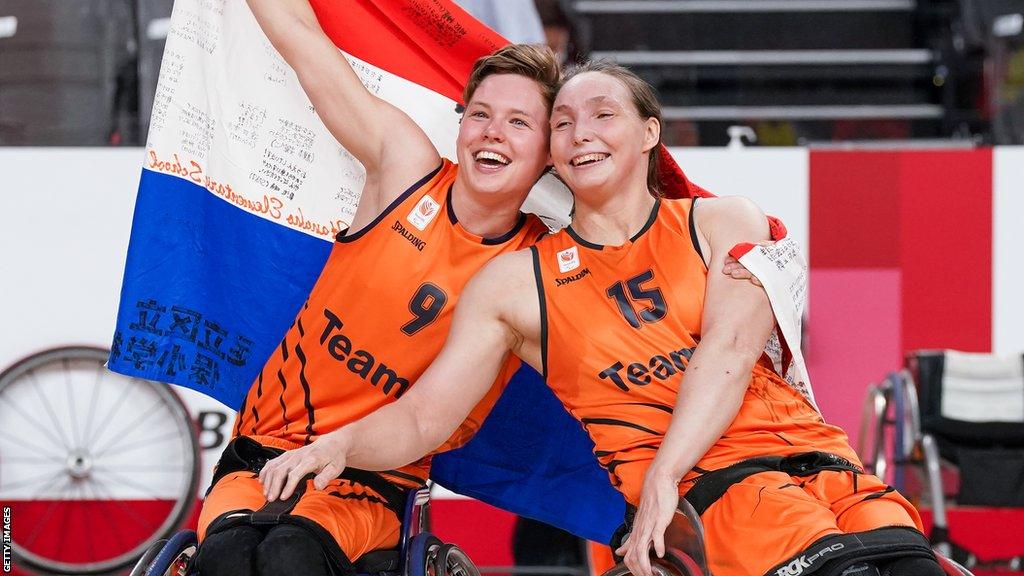LGBT+ History Month: Wheelchair basketball star Bo Kramer on different attitudes
- Published

Kramer competed in her second Paralympics in Tokyo
Bo Kramer is one of the top wheelchair basketball players in the world. A current European, world and Paralympic champion in the sport, she plays for a Loughborough Lightning side defending their Women's Premier League title. For LGBT+ History Month she tells her story and how Dutch attitudes to being gay are different to the UK.
Back at home in the Netherlands, I am seen first and foremost as a Para-athlete and being gay doesn't really come into it.
I actually prefer my sporting achievements to be recognised first ahead of the fact that, for example, I had cancer when I was younger or I am gay. While those two elements can inspire people, I don't think it should be the first thing that people need to hear about me.
Sport is my main focus - it is what I love, it is what I train for and what I can influence - the other things just happened along the way.
I have never done an interview in the Netherlands about being gay. It is just there and it is something that was never an issue or asked about.
But now that I am playing club basketball in Loughborough, I am finding that there is a lot more interest in me being an athlete and being gay - it is probably the biggest difference that I have found in the attitudes between the two countries so far.
Britain is shining a light on gay athletes in a way that the Netherlands generally doesn't, which I think may be because of societal attitudes.
We as Dutch people could be described as a bit more relaxed and accepting - maybe we have an attitude of just getting on with it and not wanting to make an issue out of it.
However, I do know that there are a lot of girls and particularly boys in the Netherlands who are struggling about coming out and being themselves so it is good that there are more stories being told.
But while I am proud of who I am, I struggle at times with the fact that there needs to be a special community for people who are not heterosexual.
There are people who want to be themselves, but then you create a community only for people who fit that description and it doesn't make sense to me.
While we do need the community to raise awareness and be visible, hopefully there will be a time when we don't need it any more.
I am just getting on with living my best life. In my ideal world, we are all just people and as long as it isn't illegal and you don't hurt anyone, you can do whatever you want in whatever gender you want.
Accepting who I am
My mom says that when I was around two years old, she thought that I would be gay when I was older.
At that point, I was just playing with boys in the woods climbing trees and coming back dirty.
In primary school, I had short hair and wore boys' clothes - but then when I was around 11, I wanted to prove I wasn't gay when everyone said I would be, so I grew my hair, wore make up and started wearing 'girly' clothes.
At that stage, I still didn't feel anything for girls and had boyfriends and convinced myself I wasn't gay. But in reality, I just wasn't ready and hadn't accepted it.
Then, when I was 19 I met a girl who I really liked and that was the first time I experienced those kind of feelings. I spoke to one good friend on my basketball team who helped me a lot and she encouraged me to kiss a girl and see how I felt.
That was the push I needed and after that I knew I was gay. My parents were very supportive - I have a twin sister and my mum was delighted at the prospect of getting a daughter in law.
I feel that in the Netherlands, being a lesbian is really well received. I've never had any bad or any negative reactions for it - especially in the sports world. And the Paralympic world is far more accepting than I think the Olympic world be.

Kramer (left) and team-mate Mariska Beijer celebrate Paralympic gold in Tokyo
I had bone cancer when I was 11 and needed major surgery on my legs. When I started playing wheelchair basketball soon after, it was like being home. Everyone was so accepting of all differences - whether you had one leg or two, whether you could walk or not, whatever colour your hair was or whatever your sexuality.
It is all about being together, learning from each other, achieving dreams and overcoming challenges on a daily basis because the world is not necessarily made for wheelchair users - but neither is it always made for gay people. There are always challenges to be faced.
Our sport's World Championships take place in June in Dubai in the United Arab Emirates - a country where being gay is illegal and could put you in jail.
There are a number of gay female athletes both on my own team and within the sport and while making any sort of statement would not be the right thing to do at the tournament, beforehand we can signal that this is who we are and we aren't going to hide it.
I have talked to a lot of the other girls about how we feel because we are going to a country where you can't be yourself. If my girlfriend came to watch the games there, I would be afraid to even give her a hug.
Not going is not an option either, because it is a world championship and we as a Dutch team will be proudly defending our title, and it also has implications for our qualification for the Paris Paralympics.
While I admit I am scared to go there because I don't know how people will react, I also hope that sharing my story can help people in countries like the UAE to show that being gay is normal and the world is not collapsing because of us.
Bo Kramer was speaking to BBC Sport's Elizabeth Hudson

Which portable heater is best?: Sliced Bread turns up the dial to find out which gives the most heat for the lowest energy used
'I hated his comedy': Steve Coogan chats to Nihal Arthanayake about British humour and cancel culture
